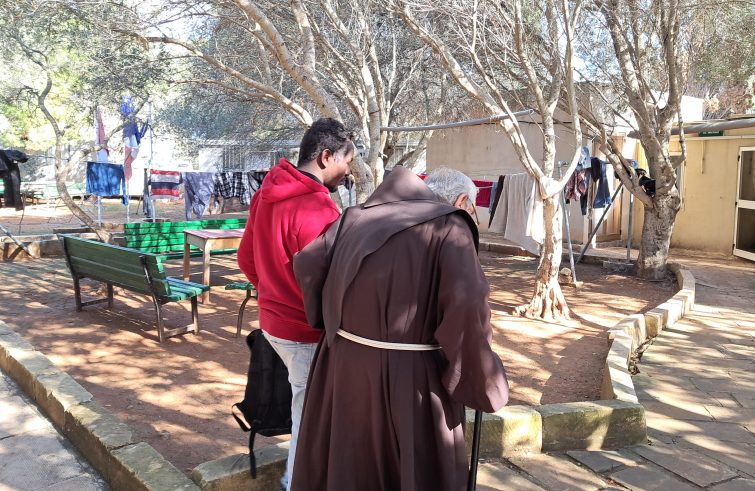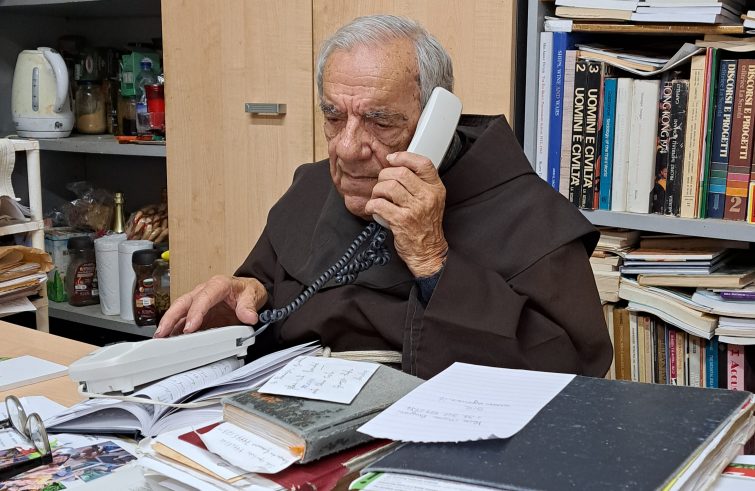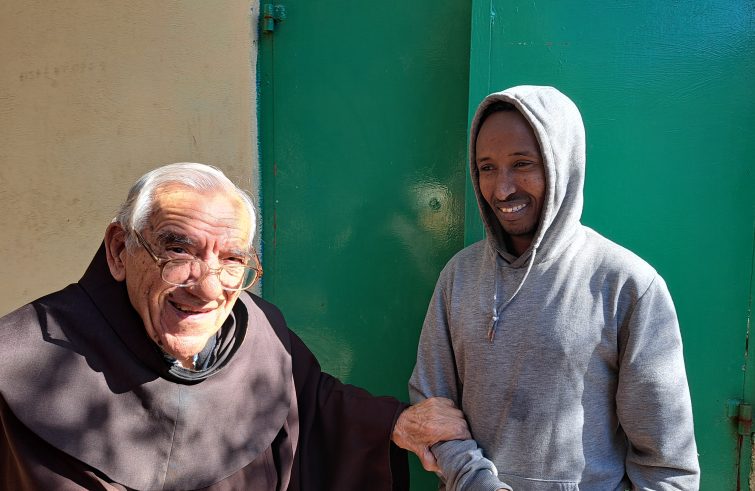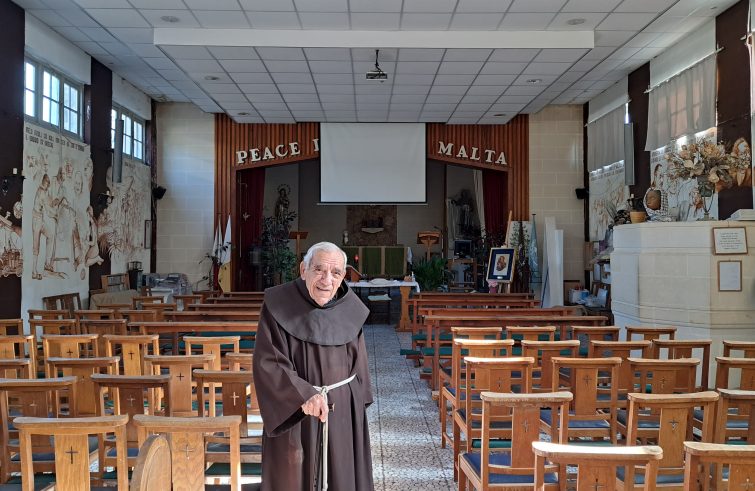
 (from Malta) There is a constant flow of young people knocking at the door or asking for information over the phone. Father Dionysius Mintoff, a Franciscan friar, answers, asks questions and gives clear instructions on where to go and what to do, despite his 93 years and a body bent by his long life. Obtaining papers as an asylum seeker is the main problem for everyone. Without it, he emphasises clearly and firmly, they either have to go back or be left on the street. The John XXIII Peace Lab is a peace workshop. Or, more simply, a place of refuge and support, a place where migrants can make a new start and build a future. Pope Francis visited this place during his Apostolic Journey to Malta in April 2022. It is situated in Hal Far, where the airport is located. Not far from here, until a month ago, there were 12,000 migrants in the refugee camp. Now there are almost none. The young people who are welcomed at the Father Dionysius Centre come from Mali, Eritrea, Ethiopia, Senegal, Sudan and Somalia, countries that have been hard hit by war, political instability, climate change and extreme poverty. The young men – says the priest – face months or even years of travel, detention and abuse. As the Franciscan priest was speaking, a young man appeared at the door. He is 26 years old. He comes from Sudan. He is wearing jeans and a red sweater. All he says, his voice broken with emotion, is one word: “home”. Then he shows a document. It looks like a passport. He holds it out as if it were his most precious asset. But the Franciscan friar tells him that it is not valid in this country, that he must apply for an asylum document, and that if he is caught without this “paper”, he risks be sent back to where he came from and spoiling everything.
(from Malta) There is a constant flow of young people knocking at the door or asking for information over the phone. Father Dionysius Mintoff, a Franciscan friar, answers, asks questions and gives clear instructions on where to go and what to do, despite his 93 years and a body bent by his long life. Obtaining papers as an asylum seeker is the main problem for everyone. Without it, he emphasises clearly and firmly, they either have to go back or be left on the street. The John XXIII Peace Lab is a peace workshop. Or, more simply, a place of refuge and support, a place where migrants can make a new start and build a future. Pope Francis visited this place during his Apostolic Journey to Malta in April 2022. It is situated in Hal Far, where the airport is located. Not far from here, until a month ago, there were 12,000 migrants in the refugee camp. Now there are almost none. The young people who are welcomed at the Father Dionysius Centre come from Mali, Eritrea, Ethiopia, Senegal, Sudan and Somalia, countries that have been hard hit by war, political instability, climate change and extreme poverty. The young men – says the priest – face months or even years of travel, detention and abuse. As the Franciscan priest was speaking, a young man appeared at the door. He is 26 years old. He comes from Sudan. He is wearing jeans and a red sweater. All he says, his voice broken with emotion, is one word: “home”. Then he shows a document. It looks like a passport. He holds it out as if it were his most precious asset. But the Franciscan friar tells him that it is not valid in this country, that he must apply for an asylum document, and that if he is caught without this “paper”, he risks be sent back to where he came from and spoiling everything.
 There are currently 54 young men hosted in the Peace Lab. But the numbers are constantly changing. In the mornings there are very few people because almost everyone is working. The centre provides food, accommodation and the opportunity to pray in the church or mosque. Every day, four doctors take turns to provide medical care in a very small clinic set up on the premises. There are also rooms for meetings and an English and ‘general skills’ school to help them adjust to the different countries they arrive in. Hasan, 24, from Somalia, comes out of one of the rooms. He works as an Arabic translator with the Sudanese boy. His life is a difficult journey through refugee camps, boat crossings, stopovers. Only his final destination is certain: he lives here now.
There are currently 54 young men hosted in the Peace Lab. But the numbers are constantly changing. In the mornings there are very few people because almost everyone is working. The centre provides food, accommodation and the opportunity to pray in the church or mosque. Every day, four doctors take turns to provide medical care in a very small clinic set up on the premises. There are also rooms for meetings and an English and ‘general skills’ school to help them adjust to the different countries they arrive in. Hasan, 24, from Somalia, comes out of one of the rooms. He works as an Arabic translator with the Sudanese boy. His life is a difficult journey through refugee camps, boat crossings, stopovers. Only his final destination is certain: he lives here now.
He laughs when asked if he has a dream. “I don’t know,” he replies. “I would be happy if I could live a good life.”
 “War is painful, very painful,” says Father Dionysius with a serious look on his face. “It hurts everyone, the victors and the vanquished. It kills innocent people. It causes suffering, destruction and death. And the more wars there are in the world, the more refugees knock on the doors of our countries for help”. He has vivid memories of the day he spent with Pope Francis. “He was supposed to be here for half an hour,” says the Franciscan priest. “In fact, he was with us for three hours and had a dialogue with our boys and listened to their stories. On that occasion, the Pope stressed the importance of “places of humanity”, where people are not treated “like numbers, but for who they are”, with their faces and stories, “simply men and women, brothers and sisters”. “We are here to bear witness,” adds Father Dionysius, “to put into practice the words of the Gospel when Jesus says: ‘I was a stranger and you welcomed me’. Seminars and lectures will not be the solution to these problems. The only way to fight injustice and poverty is to walk with the people who suffer from them”. The Franciscan takes out from among his papers a notebook filled with handwritten notes. He takes out one written many years ago:
“War is painful, very painful,” says Father Dionysius with a serious look on his face. “It hurts everyone, the victors and the vanquished. It kills innocent people. It causes suffering, destruction and death. And the more wars there are in the world, the more refugees knock on the doors of our countries for help”. He has vivid memories of the day he spent with Pope Francis. “He was supposed to be here for half an hour,” says the Franciscan priest. “In fact, he was with us for three hours and had a dialogue with our boys and listened to their stories. On that occasion, the Pope stressed the importance of “places of humanity”, where people are not treated “like numbers, but for who they are”, with their faces and stories, “simply men and women, brothers and sisters”. “We are here to bear witness,” adds Father Dionysius, “to put into practice the words of the Gospel when Jesus says: ‘I was a stranger and you welcomed me’. Seminars and lectures will not be the solution to these problems. The only way to fight injustice and poverty is to walk with the people who suffer from them”. The Franciscan takes out from among his papers a notebook filled with handwritten notes. He takes out one written many years ago:
“You have to live with people to know their problems. You have to live with God to solve them”.
What would you like to say to Pope Francis today? “I would like to tell him that on Saturdays and Sundays the church is always full of people praying for him. May God give him the strength to continue sowing seeds of love and hope, especially where there is poverty and war, and may he see them grow robust and long-lasting.”








